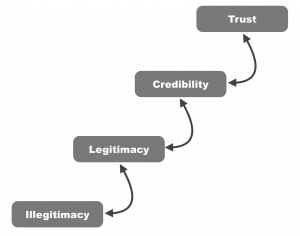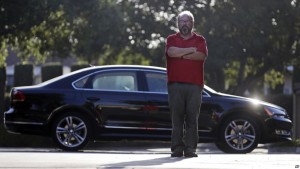When appointed CEO of Volkswagen last week after Martin Winterkorn‘s abrupt resignation, Mathias Müller stated that his first priority was to win back the trust in that many had placed in Volkswagen. In this, third posting on this topic, I would like to offer Mr. Müller some unsolicited advice on how to do that.
The social license to operate

One of the strategic issues I discuss in a new book on this topic is how a company can build up or put in jeopardy its social licence to operate. This idea, originally developed in the mining industry, has to do with the degree to which civil society accepts a company and identifies with its purpose. In a framework developed by Ian Thompson, a Canadian Consultant, a firm’s relationship with society moves up (or down) the concepts shown. What is interesting about the model is that it might take many years for a firm to steadily move up the scale and only take a short time to go down.
Volkswagen has been improving its diesel engine technology for many years and earning the respect and trust of the general public, its customers, dealers and most importantly the regulators themselves
Many Stakeholders
For Volkswagen, what makes the current predicament most complex is how to navigate across these different stakeholder groups which all, in my view, see the issue a bit differently. A segment of the general public, for example, are concerned about air pollution in general and Nitric Oxide (NO) and Nitrogen Dioxide (NO2) in particular. Regulators will also be concerned about the actual levels of pollution but also may feel that they have been tricked by Volkswagen and thus go further than seeking solutions and hope to make an example of the company to deter other firms from doing similar things in the future.

The people who are currently driving the affected cars, on the other hand, may feel less concerned about pollution per se and might be much more concerned about the re-sale value of their cars and the fuel economy they currently enjoy. While some might immediately be happy with turning the full set of pollution controls back on thought a software fix, others might resist that solution as their cars will lose some power and fuel economy as a result.
Clearly if the solution was completely voluntary, it is not clear that all drivers would choose to undergo the fix. If many do not, then the level of contamination will continue and government regulators may feel obliged to force reluctant consumers to fix the issue.
An opportunity for Mr. Müller
One approach to begin to earn back everyone’s trust would be for VW to offer a substantial cash award to those diesel customers who would bring their cars in and have the software removed. If VW were to calculate the cost of the impact in fuel economy and make some sort of allowance for the drop in re-sale value, then perhaps they would arrive at a figure between $5,000 – $10,000 per car which would be a one time payout for agreeing to have the cars correctly programmed to use the pollution control technology all of the time. Adjusted cars could potentially receive a new chrome ID that says something like “TDI+” or “Verified TDI” to publicly distnguish the adjusted cars form those that have not had the software update.
In my view, such an approach would accomplish much in terms of restoring trust although it will cost billions.
- Diesel customers would see that VW does recognize their distress and if the amount was sufficient, would feel that they were compensated fairly. They would also be able to proudly drive their Diesels which will now be clearly marked as fulfilling the environmental promise of blue motion.
- Politicians and regulators will see that VW is making a good faith effort to right a wrong
- The general public and VW’s other customers would have something positive ot say about the company as it is “doing the right thing” by both its customers and the environment
Ideally, such a move could de-activate the class action lawsuits which are currently building up steam as people could either choose to take the settlement or place their hopes in a higher number if and when the case comes to court in different jurisdictions.

This, I believe, depends on the amount of money offered and the degree to which VW can get ahead of the issue in the conventional and social media space to show that it really is trying to do the right thing and not just buying people off. Thus communication will be the key and VW could publish weekly statistics of how many drivers have made the change and perhaps publish their stories in the web.
Perhaps by taking this approach, Mr Müller could make the scandal a turning point in its engagement on the issue of air pollution and win back the trust it has lost in the last few weeks.


Very well analyzed about this emission issue, Mike!
This scandal actually only has impact from political point of view. To regular diesel vehicle drivers, I would rather suggest to do not update the software in their vehicles. Because think about the following questions: How could one company in such a period of time to modify and test a better software aligned with the legal requirement now, yet couldn’t make such a software several years ago with plenty of time to develop? How reliable would be this newly modified software?
This recall for a car means to go to hospital and let one still-perfectly-working heart taken out for a “emission-less” heart – it is risky with a lot of unforeseen bugs and has no added value whatsoever.